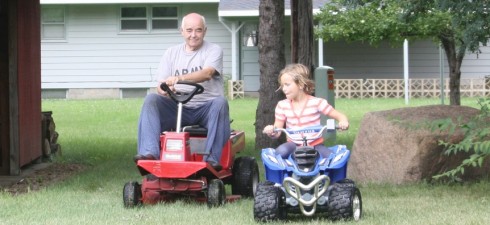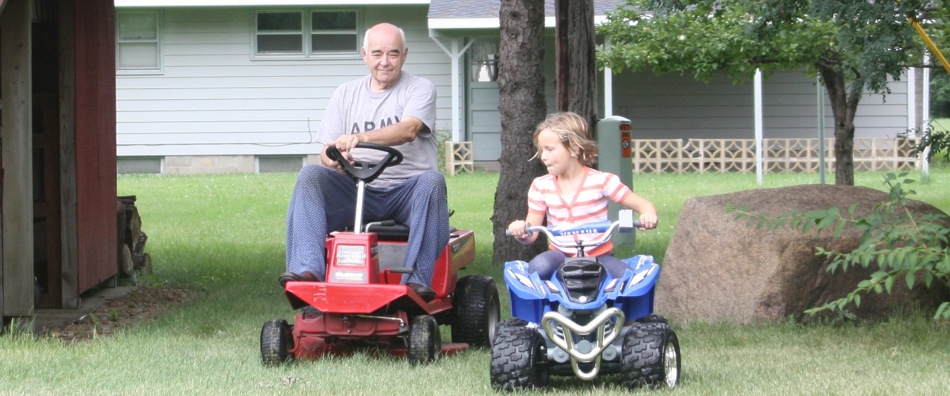My father grew up in a troubled home, poor as coal dust. A child of the depression and of divorce, he lined his broken-soled shoes with newsprint. As a child, he learned to hustle, earning nickels at the ballpark any night he could. There was no money and no father, unless we count the abusive stepfather whose unkindness to the grandmother I never met but have heard so much about deeply scarred my father. He loved his siblings dearly, but they were much younger, and my dad was on his own.
His birth father had left town before my dad was old enough to know him, and only once sent a Christmas gift. It was a pop gun. And then, rather out of the blue, when my father graduated from high school, this same father presented a job offer in another state. But after my dad moved west and in with his father, it didn’t take long to realize there was no job offer, no assistance for college, no connection. With borrowed bus fare, my dad returned home. Years later, he happened to bump into his father at a truck stop. What are the chances? My heart breaks when I picture my dad, a grown man at this time, approaching this other man, a long-haul truck driver who looked familiar, to ask his name. I see this other man looking a bit perplexed at the approaches of this stranger. “I’m your son, Fred,” my dad said to him. “Oh, yes,” replied his father slowly. And then the conversation was over.
My father grew up in a world filled with wonderful women. Some of them had kind husbands. But he had almost no role model for what it meant to be a husband and father. The conversations about mature masculinity, even if others were having them, didn’t take place in his world. No surprise then that he doubted he would ever raise children of his own. Even after joining the LDS church at age 29 and being counseled to marry, he couldn’t fathom how such a family could ever be part of his life. And so he worked day and night. No job was too small for him, because an honest wage was something to be proud of. He later enrolled night classes as well, even though college seemed equally farfetched to someone who grew up in housing projects in a small town in Idaho.
Work, save, study. Repeat. Then he added church responsibilities, along with the wonderful sense of community that came with being a member. The church was a bright spot. He learned everything he could about being a disciple. At age 35, he met my mother, and with great fear and trembling, married her. He can laugh now, but the fear that gripped him then is not forgotten – what if he turned out like his father? Like his stepfather? What if he ruined the family he was starting?
Three girls and three college degrees came. And he did not ruin us. In fact, my dad turned into a chainbreaker. That chain of abuse, addiction, neglect that he he had known as a child stopped with him. Instead, he threw himself into being the kind of father every child deserves.
When my nephew was born a few years ago, a sweet little boy who bears a striking resemblance to pictures of my dad as a baby and who shares his name, my father shared quietly and poignantly, “I wonder what I might have been if I had been born into this kind of family?” We were silent. My nephew and nieces and my own children live with easy access to swimming lessons, car seats, plentiful food, themed birthday parties, attentive Primary teachers, stellar preschool programs, adequate medical care. The works. I grieve for what my father never had, as did he, I’m sure.
And yet, I am convinced that the very factors that caused him great pain as a child and as a man also helped to forge the qualities that make him a truly stand-out parent. People who have never met my father see his picture and comment on his kind face. They do not even know of the years of dance lessons my father attended, the only dad in the waiting room, or that when my sisters and I started paper routes to earn money, he walked every single one of those routes with us. They do not know of the time my father drove hours in a blizzard to pick up a formal gown I needed for a talent competition. Or of his flair on the dance floor. I can still recall the triumph of a youth conference dance when my dad and I started to jitterbug and everyone else formed a circle around us, cheering and clapping as he spun and dipped me.
For not quite two decades, my father has also served as a Patriarch. In the LDS church, this priesthood office and calling means that he pronounces special blessings that are recorded, typed, preserved and cherished for years. (He does all of the typing himself, of course. Such work is not my mother’s responsibility.) I can picture him straightening the sitting room where he gives those blessings, preparing the space for what will happen. I can picture him slowly standing up from his private prayers, the arthritic knee aching, and limping slightly as he walks to the mirror to straighten his tie. He will have been fasting and preparing himself to listen to the Spirit.
Of course, in this world, the word “patriarch” brings with it some heavy-duty and unpleasant baggage. We are reminded, yes, of the great Old Testament prophets, but we are also reminded of the pervasive patriarchal culture that has trapped centuries of men and women in its suffocating, damaging tentacles. So I feel privileged to be the daughter of a man who showed me what it means to live a life of quiet, godly service. His mature masculinity created balance. My father, the patriarch, made it possible for me to be a feminist.


Oh, thank you thank you for this. As one who also wonders what I might have been – thank you. So beautiful.
Love this, Erin.
That’s beautiful, Erin. How wonderful that he, not only didn’t repeat the cycle, but actually used his pain to build such a legacy of love, hard work and achievement which is evident in everything you write.
So, touching. Tears flowing here. Your father sounds awesome! I can see that letting him down in any way would be soooooo difficult! I hope you emailed this to him.
Erin, such a beautiful post.
The world could use many more fathers like yours, Erin.
Wonderful post, Erin! Thanks so much for writing so movingly about your father.
And yet, I am convinced that the very factors that caused him great pain as a child and as a man also helped to forge the qualities that make him a truly stand-out parent.
I totally get this, but isn’t it a frustrating paradox? Doesn’t it suggest that if we want people to be really good parents, they should go through some awful things? But then of course not everyone who goes through awful things is made better by it. Maybe a world with fewer awful experiences for children as they grow up results in fewer outstanding parents but fewer really bad ones too? I don’t know–just thinking out loud.
Erin, I loved reading this. Your father is quite the man to rise above the lack of father figures and role models, and to fulfill his role as husband and father so very well. I am glad that I read this….truly a breath of refreshing air.